How to Remove Hard Water Build Up from Hair: 15 Easy Remedies for Healthy, Shiny Strands
How to Remove Hard Water Build Up from Hair is one of the most common concerns for people living in areas with mineral-rich water. Hard water often contains calcium and magnesium, which gradually accumulate on the hair shaft, leaving strands looking dull, dry, and weighed down. This mineral coating prevents moisture from entering the hair cuticle, causing frizz, breakage, and even scalp irritation. Over time, the effects of hard water can make your hair appear lifeless and unmanageable, regardless of how often you shampoo or condition.
If you’ve noticed your hair feeling rough, lacking shine, or becoming more tangled than usual, learning how to remove hard water build up from hair is essential. With the right cleansing methods and natural remedies, you can restore softness, enhance shine, and bring back your hair’s natural bounce. Using clarifying shampoos, apple cider vinegar rinses, chelating treatments, and mineral-removing masks can help eliminate buildup while protecting hair health.
How to Remove Hard Water Build Up from Hair
In this guide, we’ll explore effective techniques, home remedies, and professional solutions so you can finally achieve clean, healthy, and vibrant strands—even if you live in a hard water area.
1. Clarifying Shampoo Treatment
One of the most effective ways to tackle the issue of how to remove hard water build up from hair is by using a clarifying shampoo. Unlike regular shampoos, clarifying formulas are designed to deeply cleanse the scalp and hair strands, breaking down the mineral deposits that weigh hair down. By removing calcium and magnesium buildup, clarifying shampoos help restore softness, shine, and volume, making them ideal for those who live in areas with hard water.
However, since clarifying shampoos can strip away natural oils, it’s best to use them only once or twice a week. Pairing this treatment with a moisturizing conditioner ensures your hair remains nourished and doesn’t feel overly dry. Regular use can significantly reduce residue from styling products, chlorine, and hard water, leaving your hair fresh, bouncy, and manageable.
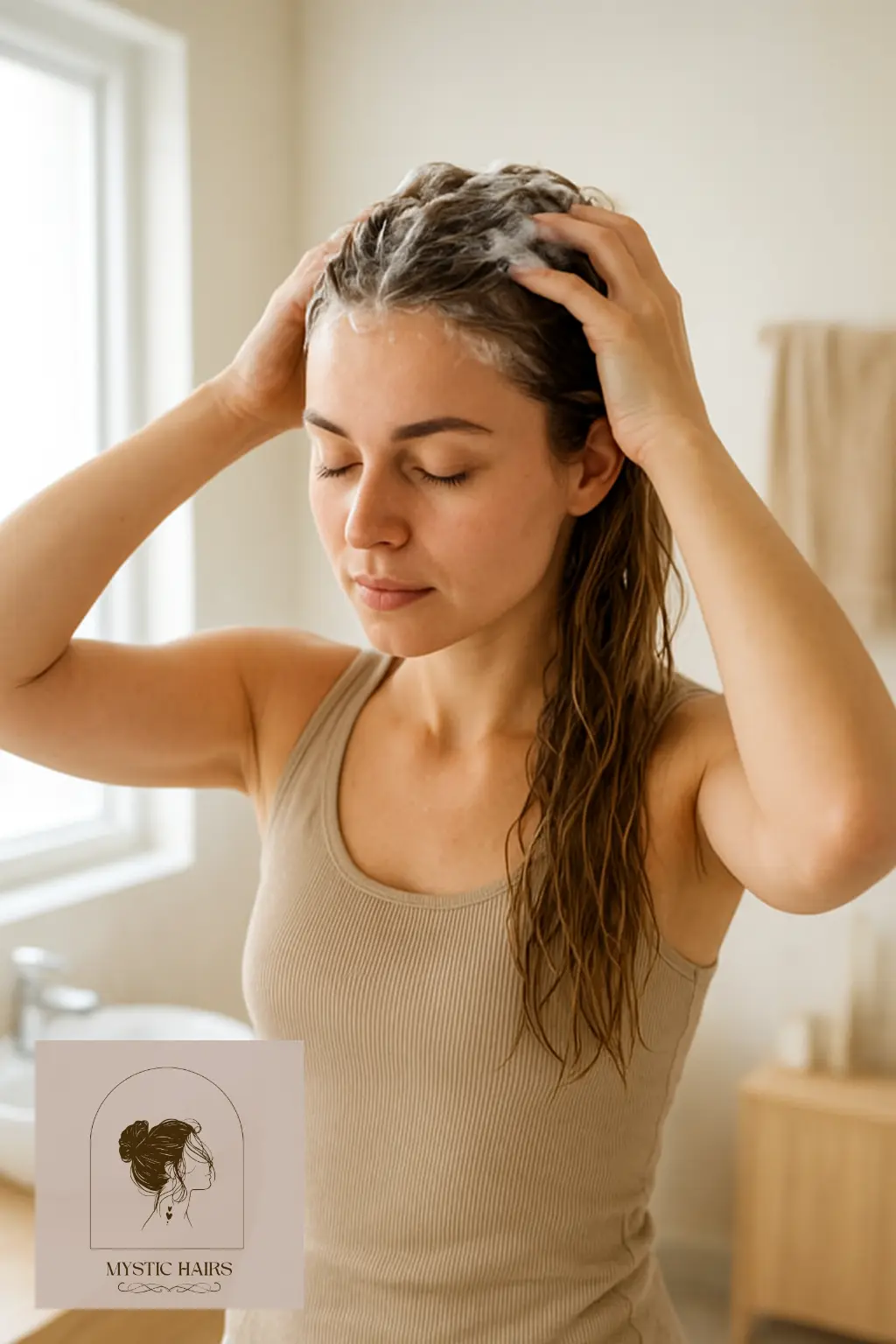
2. Apple Cider Vinegar Rinse
If you prefer natural remedies, an apple cider vinegar rinse is a great way to learn how to remove hard water build up from hair. Apple cider vinegar works as a natural acid that dissolves mineral deposits left behind by hard water. It also balances the scalp’s pH, reduces dandruff, and restores shine to dull strands.
To use this method, mix one to two tablespoons of apple cider vinegar with a cup of water and pour it over your hair after shampooing. Let it sit for a few minutes before rinsing with cool water. This simple yet effective rinse removes buildup without damaging hair, making it a go-to solution for those looking for a chemical-free way to fight hard water effects.
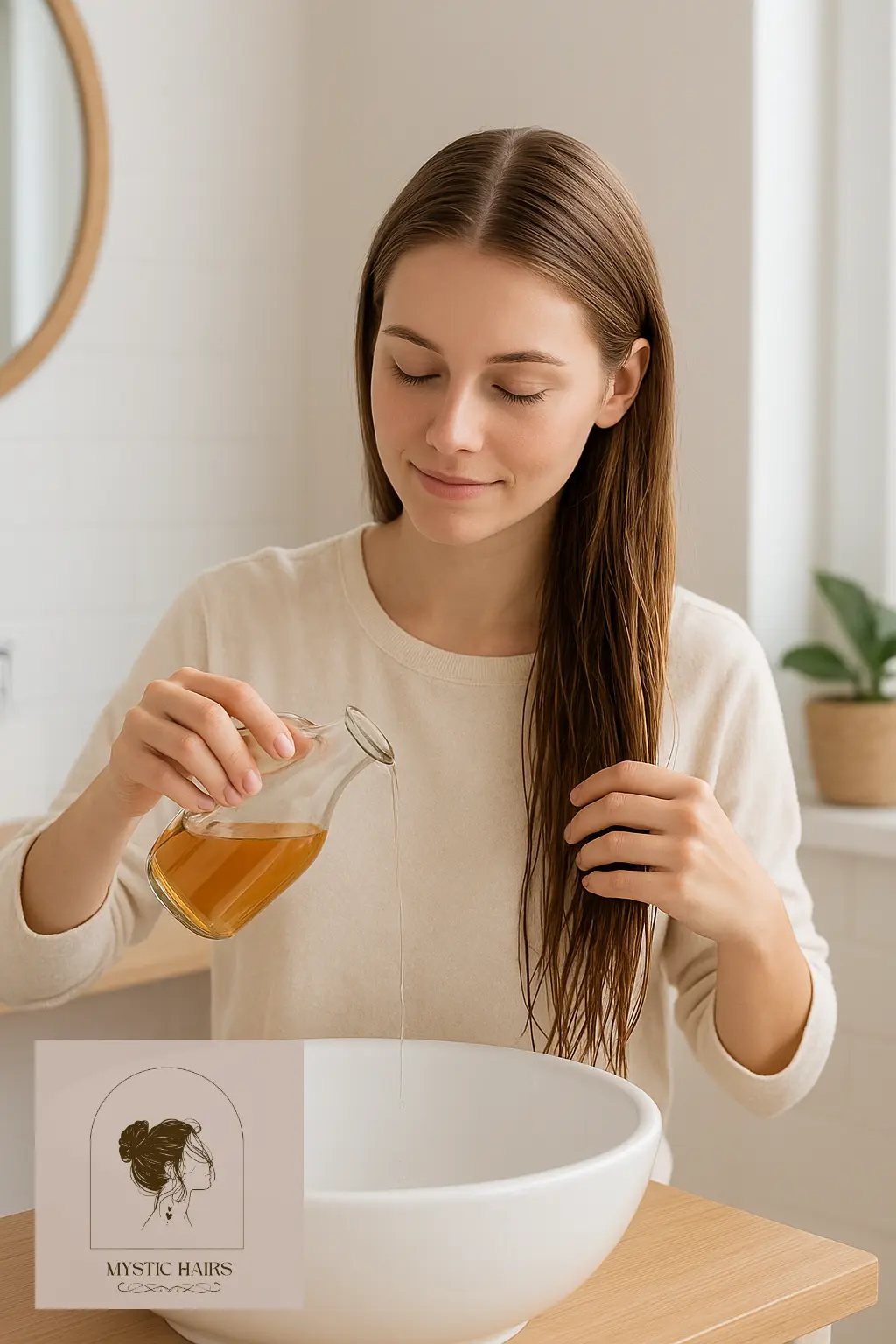
3. Chelating Shampoo Solution
For people who struggle with severe buildup, chelating shampoos are a stronger solution to how to remove hard water build up from hair. Unlike clarifying shampoos, chelating formulas contain specific ingredients like EDTA that bind to minerals and pull them out of the hair shaft. They are particularly useful for swimmers or those who use well water, as they effectively eliminate chlorine, iron, and calcium deposits.
Using a chelating shampoo once every two weeks can prevent dullness, dryness, and breakage caused by mineral accumulation. Since they are stronger than regular cleansers, it’s important to follow up with a hydrating mask or deep conditioner to replenish lost moisture. This treatment restores the hair’s natural softness while preventing long-term damage from hard water exposure.
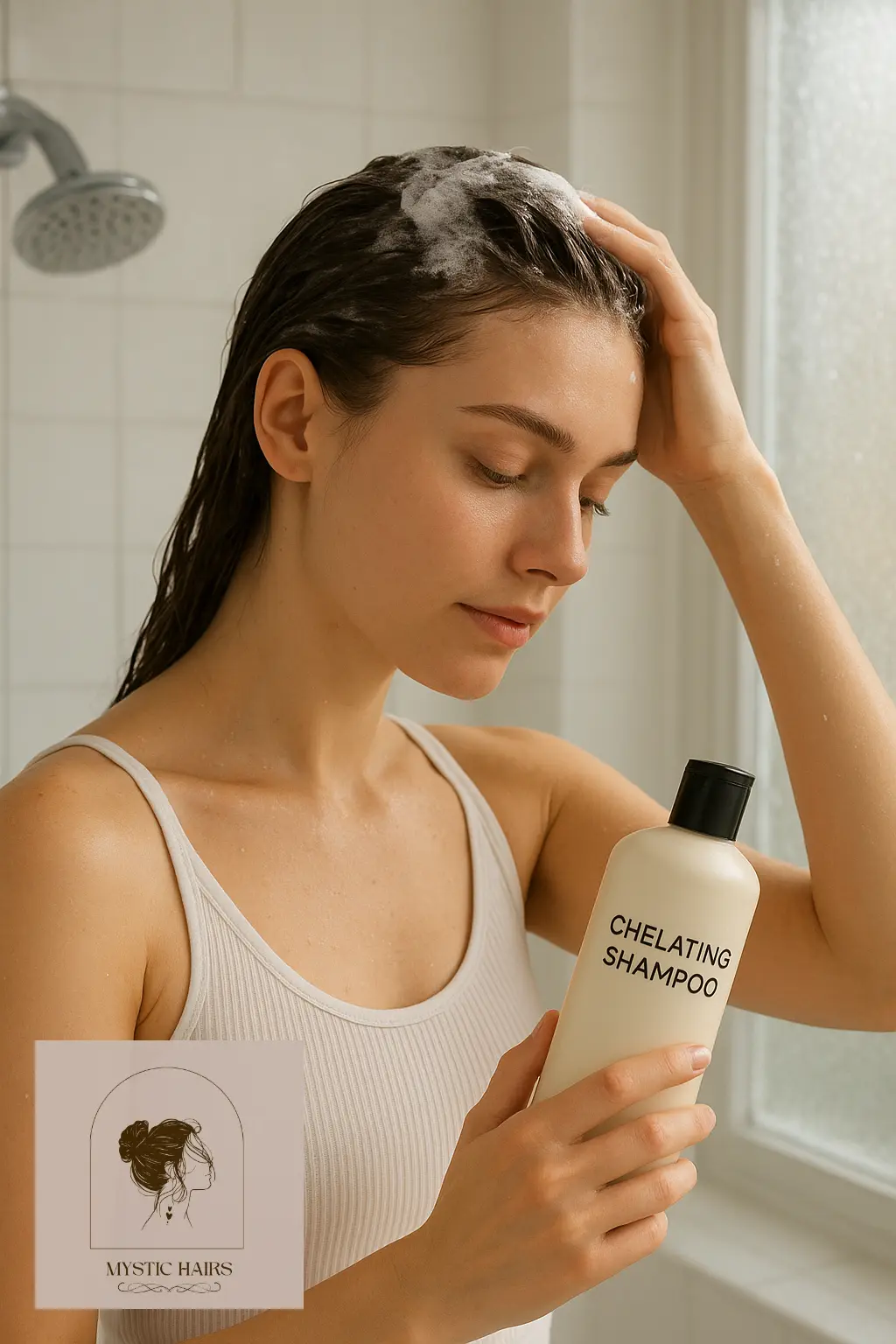
4. Baking Soda Paste
Another DIY method for how to remove hard water build up from hair is using a simple baking soda paste. Baking soda is mildly abrasive and alkaline, which helps break down mineral deposits and residue left from shampoos and conditioners. It also works as a gentle exfoliant for the scalp, removing flakes and improving overall scalp health.
To prepare this remedy, mix one tablespoon of baking soda with enough water to form a paste and apply it directly to damp hair. Massage it in for a few minutes, then rinse thoroughly and follow up with a conditioner to restore balance. This natural treatment is cost-effective, safe, and excellent for restoring clarity and shine to hair dulled by hard water.
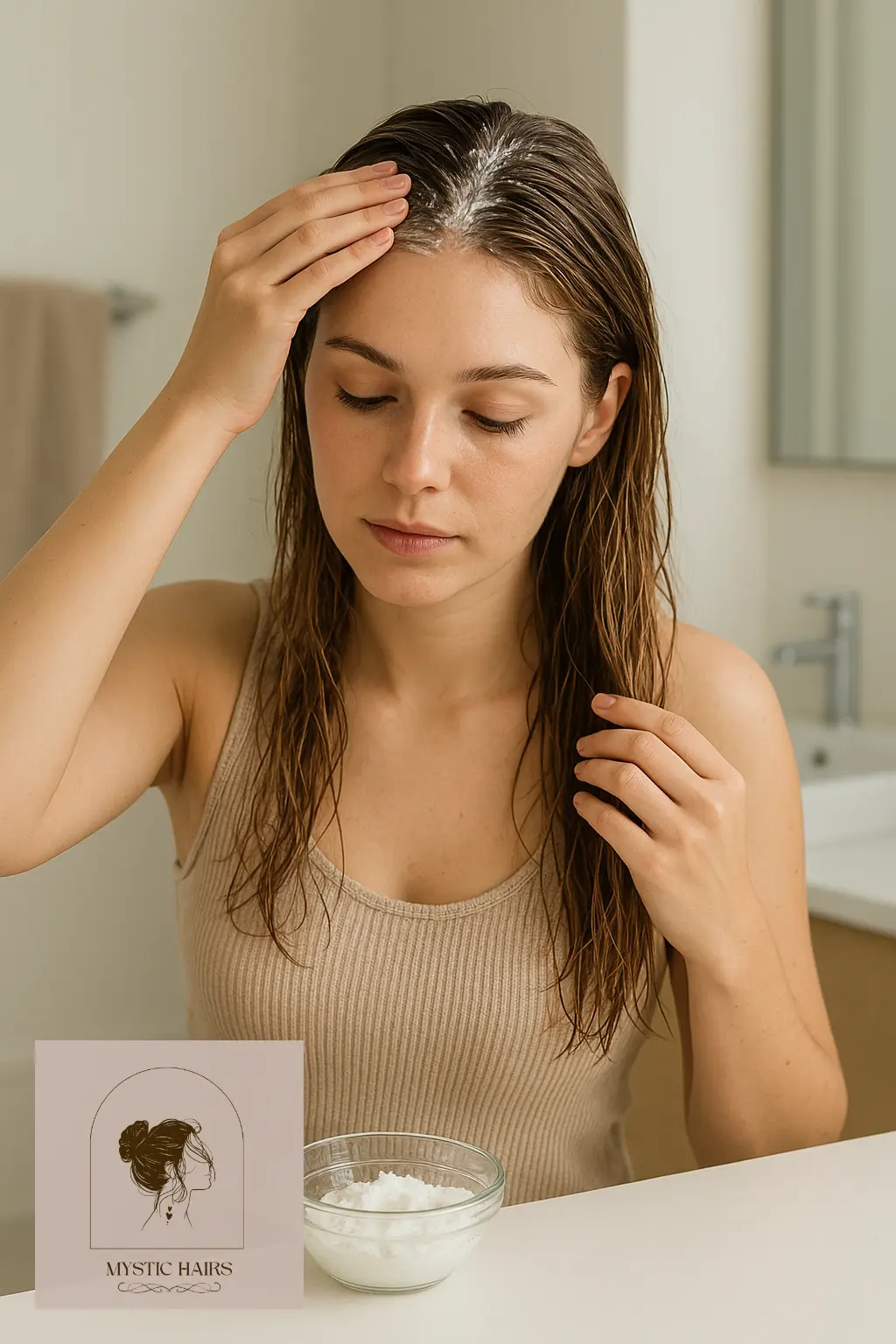
Hard water can weigh hair down and make curls fall flat. Once you learn how to remove hard water build up from hair, it becomes easier to style and discover how to make your hair hold a curl with lasting results.
5. Lemon Juice Rinse
Lemon juice is another acidic solution that helps with how to remove hard water build up from hair naturally. The citric acid in lemon juice effectively dissolves calcium and magnesium deposits, leaving hair softer and shinier. In addition to removing buildup, lemon juice refreshes the scalp, reduces itchiness, and leaves a light citrus fragrance that feels clean and revitalizing.
To use, mix the juice of one lemon with a cup of water and pour it over freshly washed hair. Allow it to sit for two to three minutes before rinsing with cool water. Regular use once a week can help restore your hair’s brightness and bounce, especially if hard water has left it looking dull and lifeless.

6. Distilled Water Rinse
A simple yet effective way to reduce mineral buildup is rinsing your hair with distilled water after showering. Since distilled water is free from calcium and magnesium, it helps prevent further residue from clinging to your strands. This method works especially well for people who are trying to minimize long-term damage caused by hard water exposure.
Instead of finishing your shower with regular tap water, use a jug of distilled water to give your hair a final rinse. Over time, this habit reduces dullness, keeps hair softer, and makes styling much easier. If you’ve been wondering how to remove hard water build up from hair without using strong chemicals, this gentle approach is one of the easiest adjustments to include in your routine.
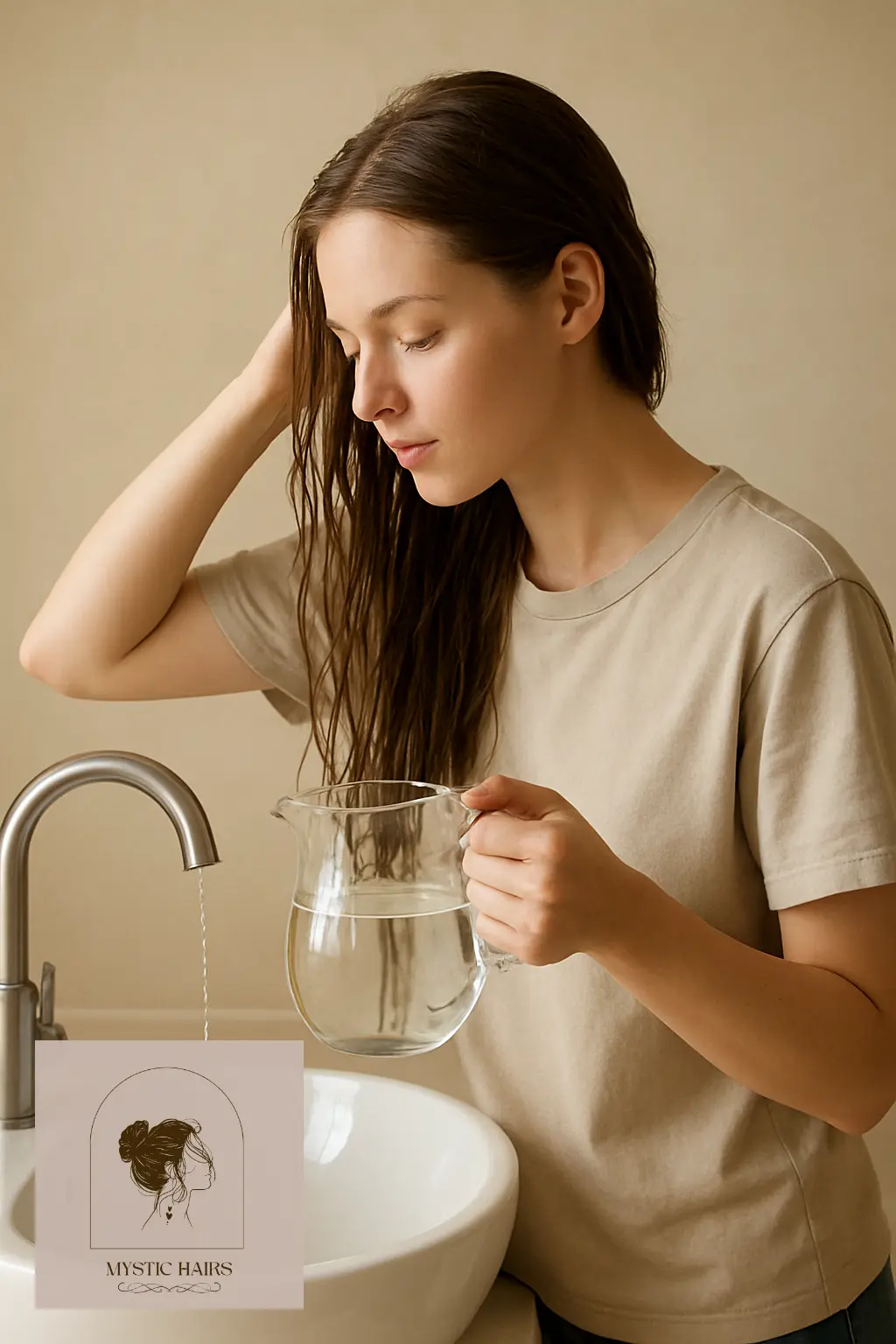
7. Vitamin C Treatment
Vitamin C is another powerful natural solution for hair that’s been dulled by mineral deposits. This antioxidant works by gently breaking down buildup and protecting the scalp from free radical damage. It’s often used by swimmers to remove chlorine, but it’s equally effective for dealing with the effects of hard water.
To use this method, crush a few vitamin C tablets into a fine powder and mix with water to create a paste. Apply it to damp hair, leave it on for five minutes, and then rinse thoroughly. Following up with a nourishing conditioner helps restore moisture balance. This is a great scalp detox remedy for anyone struggling with dryness, residue, or stiffness from hard water.
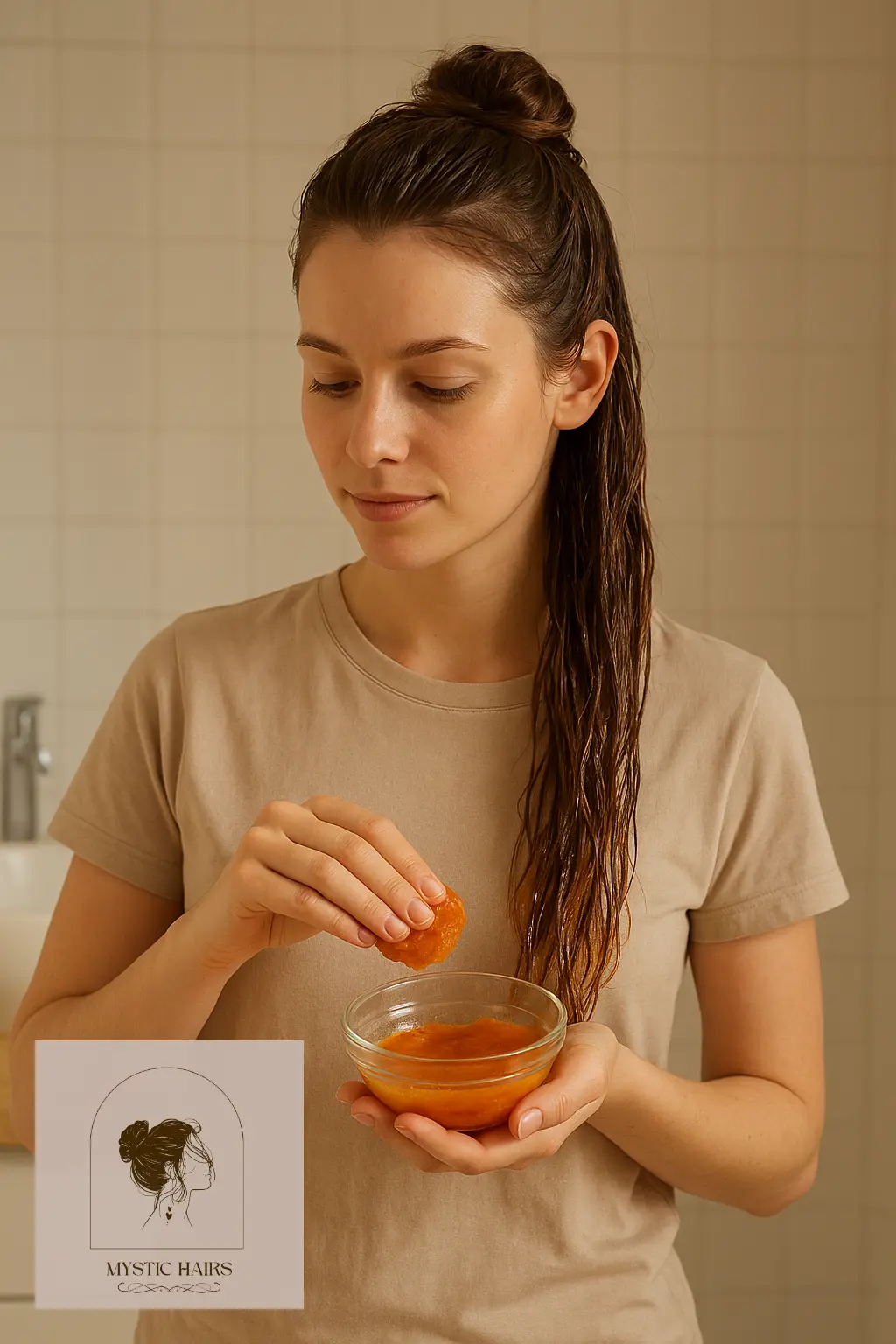
Mineral deposits from hard water often leave strands rough and unruly. Understanding why does my hair dry frizzy helps you see the link between buildup and texture problems, making removal a key solution.
8. Club Soda Rinse
Using club soda may sound unusual, but it’s an effective way to neutralize the alkaline effects of hard water. Club soda contains carbonic acid, which helps break down mineral deposits while restoring the hair’s natural shine. It also leaves hair feeling cleaner and smoother by preventing residue from clinging to the cuticle.
After shampooing, pour a bottle of club soda over your hair and let it sit for a few minutes before rinsing with cool water. Regular use can make a noticeable difference in softness and manageability. If you’ve tried other methods but still can’t figure out how to remove hard water build up from hair, this fizzy rinse can be a surprising but effective alternative.
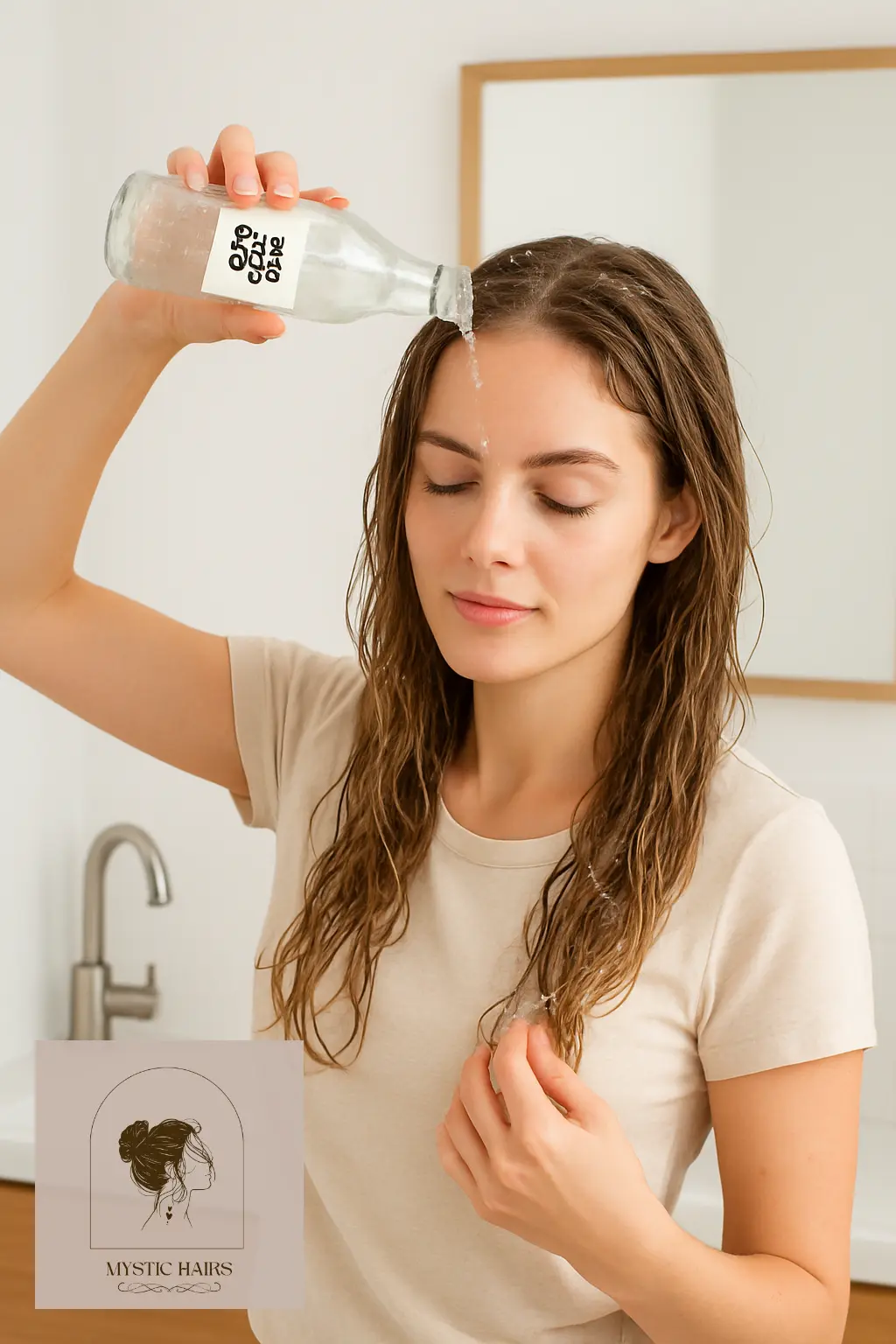
9. Deep Conditioning Masks
Moisture loss is one of the biggest side effects of hard water buildup, which is why deep conditioning masks are essential. These treatments help restore hydration, repair damaged strands, and protect the cuticle from further dryness. When used consistently, they not only improve hair texture but also help minimize the visible effects of mineral residue.
Opt for masks that contain ingredients like shea butter, argan oil, or keratin, which replenish lost nutrients. Applying a mask once or twice a week keeps hair nourished and soft, even if hard water continues to be an issue. While this method doesn’t directly dissolve buildup, it addresses the dryness and brittleness that make hair harder to manage.
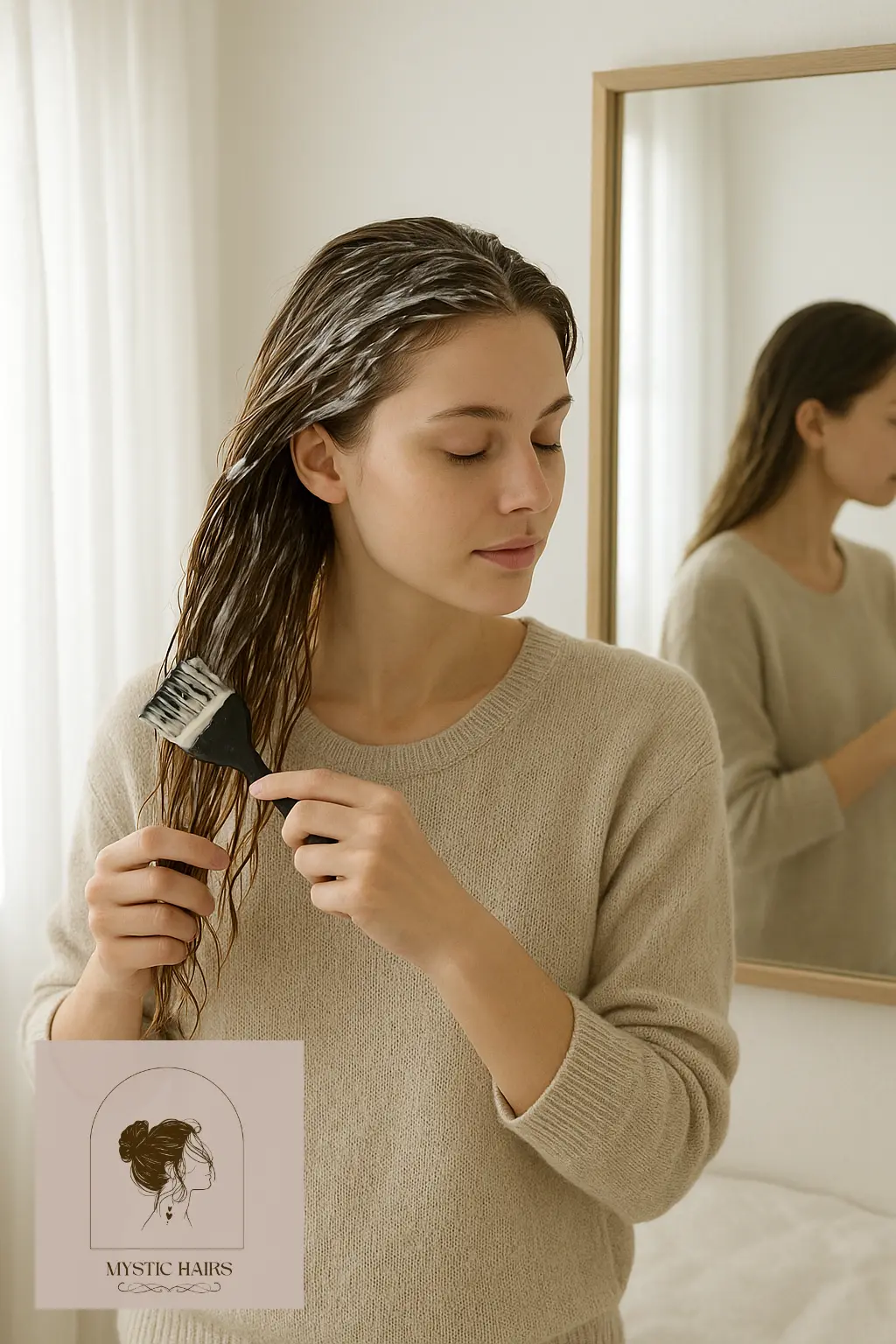
10. Aloe Vera Gel Rinse
Aloe vera is well-known for its soothing and moisturizing properties, but it can also be helpful in reducing buildup from hard water. Its natural enzymes gently cleanse the scalp, while its hydrating qualities restore softness and shine. This makes it an excellent option for people looking for natural remedies to counteract dryness and irritation.
To try this, mix pure aloe vera gel with water and use it as a final rinse after shampooing. Massage it into your scalp and let it sit for a few minutes before rinsing thoroughly. Regular use not only promotes a healthier scalp but also supports hair strength and elasticity. This method offers a natural, soothing approach for those searching for ways to maintain hair health despite hard water exposure.

11. Yogurt and Honey Mask
One of the most nourishing natural treatments for combating mineral deposits is a yogurt and honey mask. Yogurt contains lactic acid, which helps gently dissolve buildup, while honey deeply hydrates and restores softness. This combination works wonders for anyone struggling with dull, lifeless strands due to hard water exposure.
To make the mask, mix half a cup of plain yogurt with two tablespoons of honey. Apply the mixture to damp hair, focusing on the scalp and ends, and leave it on for 20 minutes before rinsing. Not only does this method reduce residue, but it also strengthens hair and improves elasticity. It’s a great option if you want a natural and moisturizing way to tackle buildup.

Hard water minerals interfere with hair dye and cause patchiness. By tackling buildup first, you’ll find it much easier to maintain vibrant results while learning how to fix uneven hair color effectively.
12. Clarifying Shampoo Once a Week
While natural remedies are effective, sometimes a stronger option is needed. Using a clarifying shampoo once a week can strip away mineral deposits, product buildup, and excess oils. This type of shampoo provides a deep cleanse that restores shine and prevents residue from making hair look heavy or greasy.
Be mindful not to overuse clarifying shampoos, as they can cause dryness if applied too often. Always follow up with a hydrating conditioner or mask to maintain balance. For those who constantly wonder how to remove hard water build up from hair without compromising moisture, alternating between natural rinses and clarifying shampoos offers the best of both worlds.

13. Baking Soda Paste
Baking soda is a well-known natural cleanser that works effectively against hard water residue. Its mild abrasive quality helps remove buildup, while its alkalinity balances the scalp. When used properly, it leaves hair looking cleaner, lighter, and easier to style.
To try this method, mix one tablespoon of baking soda with enough water to form a smooth paste. Gently massage it into your scalp and hair, then rinse thoroughly. Always follow up with an apple cider vinegar rinse or conditioner to restore pH balance. This is a budget-friendly and effective way to detox hair that’s weighed down by mineral deposits.

14. Use a Shower Filter
One of the most practical and long-term solutions is installing a shower filter. These filters are designed to reduce calcium, magnesium, chlorine, and other harsh minerals found in hard water. By softening the water before it touches your hair, you can prevent buildup from happening in the first place.
Not only does this protect your hair, but it also benefits your skin by reducing dryness and irritation. While natural rinses and treatments work as temporary fixes, a shower filter offers ongoing protection. For anyone who struggles constantly with buildup, this is the ultimate preventive solution.

15. Professional Hair Detox Treatment
If home remedies and DIY rinses don’t deliver the desired results, a professional hair detox treatment at a salon may be the best option. These treatments are specifically formulated to remove stubborn mineral deposits, restore shine, and rebalance scalp health.
Stylists often use professional-grade clarifying treatments that penetrate deeper than store-bought products. The results are immediate, leaving hair softer, shinier, and easier to manage. If you’ve tried everything and are still searching for how to remove hard water build up from hair effectively, booking a salon detox session can give your hair a fresh start.

Bonus Tips for Healthier Hair
- Rinse with filtered or bottled water occasionally – If a shower filter isn’t available, a quick rinse with bottled or filtered water after shampooing can reduce mineral deposits.
- Don’t overwash – Washing too frequently can strip natural oils, leaving hair more vulnerable to dryness and breakage.
- Protect hair while swimming – Chlorine in pool water can worsen residue buildup. Always rinse your hair immediately after swimming.
- Deep condition weekly – Regular moisture treatments help combat the drying effects of hard water, keeping hair strong and flexible.
- Alternate remedies – Mix and match methods like apple cider vinegar, lemon rinses, and clarifying shampoos to prevent over-dependence on one solution.
Conclusion
Dealing with hard water can be frustrating, especially when it leaves your hair looking dull, rough, and heavy. Thankfully, there are many effective solutions for anyone wondering how to remove hard water build up from hair—from natural rinses like apple cider vinegar and lemon water to long-term fixes like shower filters and salon detox treatments.
By combining preventive care with regular scalp-friendly treatments, you can restore shine, improve manageability, and protect your strands from future buildup. With the right routine, hard water doesn’t have to stand in the way of healthy, radiant hair.

Aria Blake is a beauty writer and hairstyle curator passionate about empowering women through timeless trends and modern haircare. With a deep love for natural textures and creative styling, Aria blends expert tips with real-life inspiration to help you look and feel your best—every single day. When she’s not writing for MysticHairs.com, you’ll find her exploring protective styles, sipping herbal tea, or pinning dreamy looks for your next hair glow-up.






